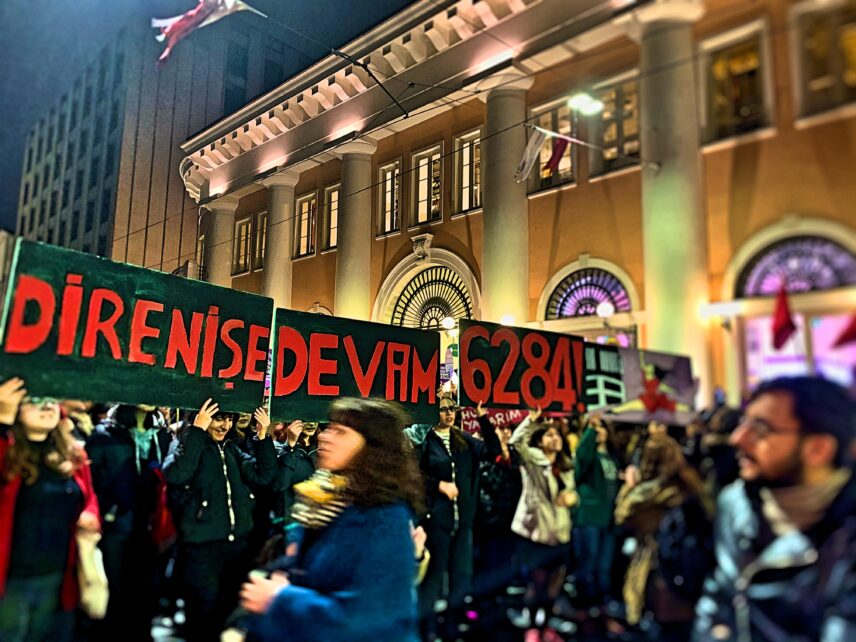Article begins
Women in Turkey have taken up the legal field as a site of struggle. Between 2014 and 2016, I conducted ethnographic research, along with recent follow-ups, to understand how feminist lawyers find a balance between their professional and activist work.
Feminist lawyers in Turkey are professional attorneys who self-define as feminists. They instrumentalize their power as lawyers to support women and replace discourses that render women subordinate. Feminist lawyers select and litigate a number of pro bono gender-based violence cases based on their priorities and campaigns as activists. Many of the feminist lawyers I have met also actively work in grassroots organizations for LGBTIQ+, minority, refugee, workers, and environmental rights, addressing the intersectionality of multiple modes of discrimination.
My aim was to understand how feminist lawyers maintained their activism as professionals working within the rigid Turkish legal system. To my surprise, this rigidity was what feminist lawyers harnessed to denaturalize the hegemonic sexist norms reproduced in the written laws and courtrooms in Turkey. Below, I present a vignette from a trial in January 2020. I use pseudonyms and deliberately avoid location details for confidentiality purposes.

Seeking gender equality in the Turkish courtrooms
Unlike the common law systems based on precedents, the ideal primary sources of the Turkish civil law system are the codified, abstract, general, and written principles in fundamental codes and procedural rules. The feminist lawyers I worked with confirmed that the law education and courtroom expectations in this system discourage verbal arguments and dialogical in-court presentations.
Although seemingly codified and abstract, the legal system in Turkey often operates in the hands of heteronormative law enforcers, with patriarchal mindsets, who reinforce the idea that the protection of the Turkish family and manhood are the priorities. For example, a judge in Ankara rejected a pregnant woman’s demand to divorce her husband who used violence against her in 1987, reasoning that she should not have carried her husband’s baby if she wanted a divorce, and uttering “you should not let a woman’s back go without a beating and her womb without a baby” (a proverb in Turkey) (Şakir 2021). Dicle Koğacıoğlu (2004) shows how the framing of honor crimes as a traditional practice in the written laws and courtrooms generated the idea that women deserve to die for their family’s honor. Many judges abate the penalties of male killers of women by considering women’s–allegedly–sexually active pasts as reasons for unjust provocation (Sade 2021).
To fight against these unequal daily practices, feminist lawyers have been mobilizing the rigidity, authority, and consistency claims of the written laws in the Turkish legal system.
The courthouse
One can easily see this rigidity through the spatial features of the courthouses (Ellialtı-Köse 2018). From the outside, the courthouse we walked toward looked like a beige box with dozens of small square windows. There were three entrances: for staff; for judges, prosecutors, and lawyers; and for the public (genel). I took the entrance for the public, while the five feminist lawyers I accompanied walked inside with judges and other lawyers through the entrance designated for them. I initially lost sight of my lawyer friends as it was overwhelmingly labyrinth-like inside. On the left, by the door of the police room, a board read, “Everyone is the police of their conscience,” with the signature of K. Atatürk, the founder of the Republic of Turkey. Peaking at a courtroom, I saw that the judges’ seats were designed to be higher than the seats of lawyers and attendants.
When I finally met my lawyer friends again, they were sitting in the waiting area discussing what the defense attorneys would possibly say. The plaintiffs then came in, Nebahat and her daughter Ayla. They had filed a lawsuit against Ayla’s uncle from her father’s side, who had sexually assaulted her for over ten years. Immediately after sitting next to us, Nebahat tried to give an envelope filled with cash to the lawyers, who kindly rejected it: “Please donate this to the women’s organizations we told you about.” They, however, accepted Nebahat’s offer to be treated with Turkish tea and toast with kasseri cheese in the upstairs café of the courthouse. Feminist lawyers’ unpaid labor stood in stark contrast with the generously paid big shot defense attorneys, one of whom was the bar president of a city in Northwestern Turkey. Nebahat told us that the uncle’s family had sold a house to be able to afford the cost of hiring the defense attorneys.
The trial
Throughout the entire trial, I listened to the two male defense attorneys in terror. I felt my legs trembling and my heartbeat in my stomach, causing nausea. The defense attorneys were not concerned with demonstrating any evidence or citing any legal codes, implying that they thought their arguments were self-evident and above the written law. It was evident that they knew that if they could mobilize the normative gender ideologies sufficiently, their client could possibly get away with a decade of sexual assault.
Instead of producing evidence to defend their client, they kept accusing Nebahat of lying to extract money and blaming Ayla for engaging in “inappropriate” habits like smoking, drinking, and having a boyfriend. The defense attorneys also kept arguing that the feminist lawyers were biased due to their activist backgrounds. They said that the defendant was just a very compassionate person, and feminist lawyers were unable to distinguish compassion from sexual assault. Although forensic reports did exist on the uncle’s sexual assault, the defense attorneys accused the institution that produced the reports of being biased. They also tried to push the plaintiffs to go to the pediatrics department of a hospital they named to seek “physical” evidence. In short, the defense attorneys acted as if they were the plaintiffs or even the judges themselves, constantly questioning the moral character of the plaintiffs and the professional competence of the feminist lawyers.

The feminist lawyers, on the other hand, could not rely on their own values and ideals to make their case. They knew that their ideals were not widely shared in Turkey. In the days and nights that they worked on this case with other feminist activists prior to the hearing, feminist lawyers discussed how they had to literally teach written clauses from the penal code, protection law, and international conventions to the judges and defense lawyers. To have the upper hand against the heteronormative and patriarchal judgments, feminist lawyers had to strictly adhere to the language ideology of the civil law system in Turkey that emphasizes the consistency, authority, and superiority of written laws over other forms of communication.
In their presentations, feminist lawyers first explained how feminism was not a weakness but a strength in their case, as they were well-versed in the workings of gender-based violence. They reminded the defense attorneys that they are equal, regardless of their identity as feminists or women, citing the Constitution. Instead of emphasizing one isolated incident of criminal behavior, they stressed how the uncle’s sexual violence against Ayla had been long-term, systematic, and an example of gender-based violence. They explained systemic violence, sexual violence, and psychological violence by giving references to the Protection Act and the international Istanbul Convention. They also defined consent, rejecting the logic that frames alcohol consumption, tobacco use, or having a boyfriend as consent-invalidating factors. While doing so, feminist lawyers explained how the logic of the defense attorneys normalizes and contributes to the perpetuation of rape and women killings in Turkey, citing the latest statistics on femicides.
This case ended up with the highest possible penalty for the uncle without any remission. Yet, the most important achievement for the five feminist lawyers was that the judges acknowledged the uncle’s violence as a systemic, long-term one without demanding physical evidence from Ayla.
Indeed, many feminist lawyers do not fight to increase the already heavy penalties in Turkish laws. Instead, they advocate for better frameworks to address gender-based violence, supportive institutions for women to safely resort to when they need to, and education and rehabilitation of the male perpetrators of violence against women. Moreover, feminist lawyers aim to shape the judges’ perspectives to prevent them from abating men’s penalties based on sexist norms and from trivializing women’s statements, as well as to incite them to penalize “petty” crimes against women, such as catcalling and stalking.
Gender equality beyond the courtrooms
Written laws are one of the very few instruments feminist lawyers can use. Hence, in addition to collectively litigating gender-based violence cases, feminist lawyers, and other feminist activists, have been taking part in designing and writing laws and lobbying in the parliament for their better implementation since the 1980s.

Women’s most recent struggle in the legal field in Turkey has been against President Erdoğan’s recent decree to annul the Istanbul Convention on the night of March 19, 2021. The Convention was signed by the member states of the Council of Europe in Istanbul, Turkey, on May 11, 2011. It was then unanimously approved by the Turkish parliament in 2012. The Convention legally binds the signatory nation-states to protect women from multiple forms of violence (e.g., physical, sexual, psychological, economic, forced marriage), including the ones perpetrated by people beyond the victim’s immediate family (e.g., ex-partner, partner, stalker, friend, relative, etc).
Many connect Turkey’s 2021 withdrawal from the Convention with Erdoğan’s goal to receive support from foundations, cults, and small-scale political parties known for their alignment with political Islam (Independent Türkçe 2019). These groups have been against the Convention, since it acknowledges gender and sexual orientation (and hence is pro-LGBTIQ+), involves clauses on relationships beyond marriage (such as sexual partnerships), and clearly states the aim to establish gender equality (which some religious fundamentalist groups consider is against the disposition [fıtrat in Turkish, fitrah in Arabic] of men and women (BBC Türkçe 2014; Ensar Vakfı 2020).
Throughout the second half of March 2021, thousands of people, the majority of whom were women and LGBTIQ+, protested on the streets of more than 30 cities across Turkey against the withdrawal from the Convention (Evrensel 2021). Necla, a feminist lawyer, said that the police officers have already started to reject women’s applications for protection from their abusers, stating that the “system has changed.”
The importance of written laws in Turkey arises from their ability to frame inequalities and shape perspectives from a hierarchically higher and normative position. However, how this position is understood and instrumentalized matters more in the everyday lives of people. Justice and equality are not easily accessible for everyone. Feminist lawyers in Turkey design, make, and use the hierarchy and rigidity of the written laws to democratize justice and render gender equality a bit more reachable.
María Lis Baiocchi and Leyla Savloff are contributing editors for the Association for Feminist Anthropology’s section column.

